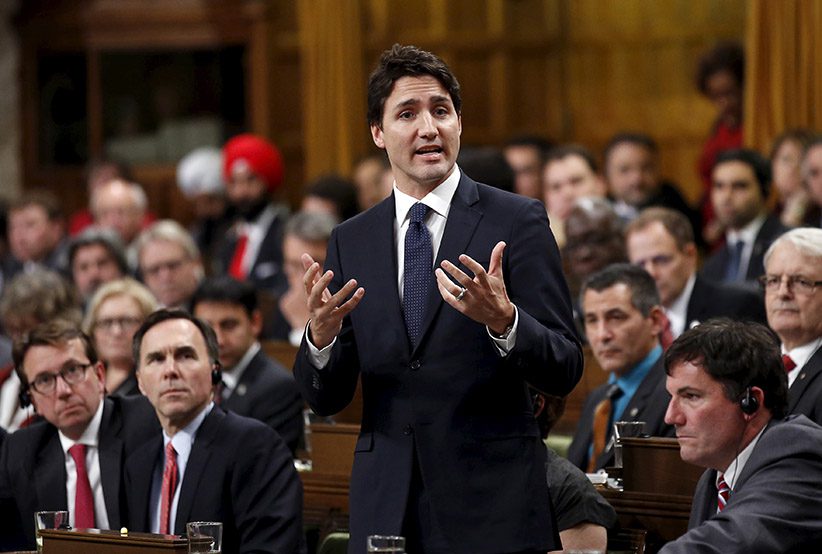When Canadians tuned in to their favourite network on budget d‎ay, they were expecting to see the Finance Minister giving his speech and getting the details on what the government had in store for them. Instead, they watched anchors, journalists, experts and other talking heads scrambling to fill up time until Bill Morneau was allowed to speak.
One can only imagine the TV producers cursing as they watched the opposition throw a wrench in their coverage plans. ‎ Some anchors were apologizing to their viewers for the delay, explaining superficially what was happening but not really why, basically dismissing the whole thing as procedural shenanigans and the usual political circus.
By delaying the tabling of the budget, Conservative and New Democrat MPs ‎were doing their best to bring attention to the most recent power-grab attempt by the Trudeau government.‎ Too bad if millions of Canadians had to wait another half-hour to find out which tax was being increased or which credit was being cut.
‎The stunt, as some called it, worked as more air time and column inches were devoted to the issue than in the preceding days, when everybody was consumed with pre-budget leaks and speculations.
‎Now, there is nothing wrong with wanting to modernize the way the House of Commons works. ‎Bringing forward proposals to do so is absolutely legitimate. And this is what ‎Liberal House Leader Bardish Chagger did when she brought forward a discussion paper on this very issue two weeks ago. The opposition was skeptical and raised concerns, as they should.
Everything went south however when ‎the Liberals tried to ram through a process and a timeline at the Procedure and House Affairs Committee in order to adopt these proposals‎ unilaterally. Double ramming! So much for discussion. Good bye consensus. The opposition was outraged that these changes could happen without their support and a filibuster ensued a tool which, coincidentally, the government wants to do away with!
This is the second time the Trudeau Liberals have tried to kneecap the opposition. Last May, in a knee-jerk reaction to almost losing a vote in the House, the government tabled Motion 6, which would have removed most of ‎the few tools the opposition has to slow down the government's agenda, giving even more power to the government over Parliament‎. The opposition balked and pushed back, using tactics that ultimately led to Justin Trudeau losing his cool and causing the now infamous "elbowgate".
Once again this week, the PMO might have overplayed its hand. ‎ Which is unfortunate, as some changes might be well worth considering carefully.
It might indeed be time to bring in electronic voting in the House. While it would remove the possibility for the opposition to "slow-vote", this is not exactly the most effective form of protest. It would, however, speed things up and possibly allow for more dissent, as MPs would not feel the same pressure to toe the party line as they do when they have to stand up against their own.
The elimination of Friday sittings is another one. Most legislatures already do not sit on Fridays. This would allow MPs of all stripes to spend more time in their ridings. But it would also benefit the government. Even though the day is shortened and attendance sparse, it is one more day for the opposition to keep the government accountable, one more day of coverage on any given issue the government would rather avoid scrutiny on.‎
Other proposals while disguised as modernization, seem to be more about the normalization of undemocratic practices.
For instance, the Liberals committed to "end the improper use of omnibus legislation". They would somehow make it "proper" by adding extra votes and allowing their division for committees' study. Proper thing?
The government is also proposing to do away with Time Allocation, a tool used with great regularity by governments to shut down debate. This is a good idea MPs should be able to take the time necessary to study government legislation. Parliament should not be considered as the government's rubber stamp.
Sadly, the Liberals wants to replace Time Allocation with something worse: pre-programmed time limits for the House and committees to debate bills, avoiding the annoying process and potential backlash of imposing Time Allocation, all while shortening MPs' speaking spots. Similarly, stripping MPs of the right to move motions during Routine Proceedings would remove one of the only tools the opposition has to slow down legislation and set the agenda.
Finally, ‎The PMO doesn't particularly enjoy having to keep Trudeau in the House regularly for Question Period, so they are proposing to have him show up only once a week, like they do in the UK.‎ It would make it much harder for the Opposition to keep the PM accountable. Funny thing is, there is absolutely nothing preventing Trudeau from acting unilaterally and showing up only once a week to take all the questions that day. Indeed, Trudeau skipped QP the day after the budget. Clearly, the PMO would rather do it under the cover of the rules.
Getting rid of the long-standing tradition to obtain an all-party consensus before overhauling the Standing Orders is a terrible idea, no matter how annoying the opposition can be with the limited tools it has. ‎ It would create a dangerous precedent and set our democracy on a slippery slope. If Stephen Harper had tried such a power grab, the Liberals would have rightly been apoplectic. So why, as NDP House Leader Murray Rankin wisely asked last week, do they want to hand over these powers to Kevin O'Leary? Or to Kellie Leitch, for that matter? Or Mad Max? Gawd. Mad Max…
Photo Credit: Macleans






